Swiss Police Kill Iranian Asylum Seeker In Train Hostage Situation

Swiss police killed a 32-year-old Iranian asylum seeker who held 15 hostages for several hours on a train using an axe and a knife on Thursday.

Swiss police killed a 32-year-old Iranian asylum seeker who held 15 hostages for several hours on a train using an axe and a knife on Thursday.
The incident occurred between Baulmes and Yverdon-les-Bains in western Switzerland, with the man holding the passengers captive for almost four hours until police stormed the train late on Thursday evening.
According to reports from Vaud police, the hostage-taking began around 6:35 pm local time, when the assailant, speaking Farsi and English, forced the train engineer to abandon his post and join the 14 passengers onboard. The train was immobilized with its doors closed at the Essert-sous-Champvent station, between Baulmes and Yverdon-les-Bains.
Authorities were alerted by passengers directly, leading to the sealing off of the area to facilitate negotiations with the hostage-taker.
The intervention occurred when the perpetrator was separated from the hostages, as stated by Jean-Christophe Sauterel, spokesperson for the Vaud cantonal police. “As the hostage-taker rushed with his axe in the direction of the intervention group, a police officer used his weapon to protect the hostages, fatally hitting the perpetrator,” explained Sauterel. Despite the presence of a doctor among the police team, the man died at the scene, with police asserting that they acted in self-defense.
The Vaud Public Prosecutor's Office has started a criminal investigation into the incident. Attorney General Eric Kaltenrieder stated, “The man's motivations have not been established, nor his psychological state.”
Switzerland is relatively safer among European countries, and hostage-taking incidents of this scale are very rare in the country.
In December, Arman(d) Rajabpour Miyandoab, an Iranian-French national, was arrested in Paris during a deadly knife attack on people.
Rajabpour's social media account, which was opened in the same month on the X platform, contained "many posts about Hamas, Gaza, or generally Palestine."
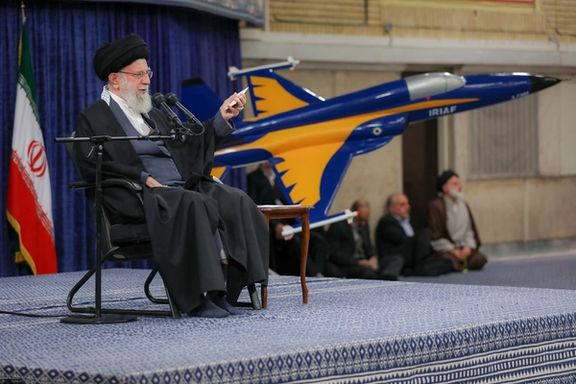
The United States and Israel should tell Iran it risks an “overwhelmingly powerful strike” if it moves to make a nuclear weapon, leading weapons expert David Albright told Iran International.
In an interview on Thursday, Albright warned that a “convergence of factors” means “this is the time that “Iran may decide to make nuclear weapons.”
“You have a situation where the security incentives for Iran to build nuclear weapons have increased,” he pointed out. “The transparency of the nuclear program has decreased significantly.. Their nuclear weapons capabilities have grown over the last several years… And it's also a point in time where people's attention is elsewhere. The Iran nuclear issue barely makes the newspapers these days.”
David Albright is a world leading weapons expert and the founder of the Institute for Science and International Security. He was associated with the UN's International Atomic Energy Agency (IAEA) in the late 1990s and raised questions about the evidence that led to the US invasion of Iraq in 2003.
Speaking with Iran International’s Fardad Farahzad, Albright called the current moment “a point of extreme danger”, where Iran can make a “crude” nuclear explosive in six months.
“By crude I mean, you can't put it on a ballistic missile and hope that it will survive,” he said. “But it would work underground as a test. And most importantly, it would just signify through, say, a week that Iran was a nuclear weapons power.”
In the past two decades, every US president has announced that a “nuclear Iran” will not be tolerated, often stressing that “all options are on the table” to prevent the regime in Tehran acquiring nuclear weapons. And in the meantime, Iran has advanced its nuclear capabilities in every respect.
The argument in some policy circles is that Iran would have to do tests to become ‘nuclear' and that would give the US government (or Israel) the time it needs to find a response. But Albright believes the evidence suggests otherwise.
“Iran does not need to do a nuclear test to build a nuclear weapon,” he said. “Their original weapons program that ended around 2003 was a program that was designed to avoid the need to conduct a ‘full scale’ test… they can test the components, the subcomponents, and then test the whole assembled device minus the weapons grade uranium, and have a way to know if that test was successful, which we call a cold test.”

There is no evidence at the moment to suggest Iran has had a ‘cold test.’ But it is something that can happen with relative ease and in a short time, according to Albright.
Which leads, inevitably, to the question: is there anything that can be done?
“President Biden, backed up by the Israeli government, should say that we are watching you, Iran, even though we have other priorities,” Albright said. “and if you move to make nuclear weapons, we're going to launch an overwhelmingly powerful military strike.
“And that's desperately needed is to empower the IAEA. They're the people on the ground that can look for suspicious activities. If Iran is going to make a nuclear weapon, it's going to have to divert at some point in the six month process the enriched uranium. And the IAEA can look for indications of diversion, insist on being at the sites, resist being excluded from the sites.”
But would any of these work?
“We know from past experience that Iran won't give in completely to this kind of pressure,” Albright said, “but it does get nervous. And that's part of the purpose is to throw the Iranian regime off balance and then in parallel, make sure that the Iranian regime understands that overwhelming military force could be applied.”
There is another side to this ‘threat’, though: it could convince the Iranian regime that it could survive only if it becomes a nuclear power –like North Korea, as some ultra hardliners in Iran would like to say.
But Albright believes a “balancing act” is possible if the US and Israel move swiftly to make the regime understand “it's not in its interest to build nuclear weapons” before it reaches a definite conclusion that it has to have “nuclear deterrent” against the US and Israel.
“We're worried that the US and Israeli intelligence agencies are distracted,” Albrighrt told Iran International, “and Israeli intelligence isn't foolproof, as this attack on October 7th proved in a very dramatic way.
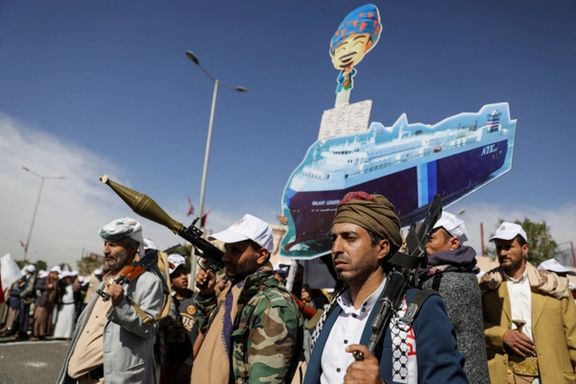
US forces on Thursday conducted seven "self-defense" strikes against Houthi naval drones and cruise missiles that were prepared to be launched against ships in the Red Sea, the US military said.
"CENTCOM identified these missiles and USVs (unmanned surface vessels) in Houthi-controlled areas of Yemen and determined they presented an imminent threat to U.S. Navy ships and merchant vessels in the region," the US Central Command said in a statement on X.
Iran-backed Houthis began attacking commercial vessels and US warships in mud-November after the Islamic Republic’s Supreme Leader Ali Khamenei called on Muslims to blockade Israel.
The Houthi campaign has disrupted international shipping, which uses the Red Sea and the Suez Canal to link Europe with Asia. The United States and Britain have recently launched strikes on Houthi targets in Yemen and returned the militia to a list of "terrorist groups."
Iranian armed proxy militias have been launching attacks on US forces also in Syria and Iraq since mid-October. After a few smaller retaliatory strikes, the United States launched a large air campaign on February 3, targeting dozens of bases belonging to militias controlled by Iran’s Revolutionary Guard.
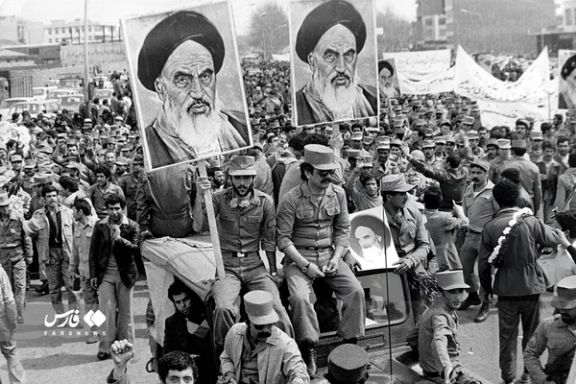
A member of Iran's Expediency Council suggests that while the Islamic Republic was once promising to become the Japan of the Middle East, it now risks resembling North Korea.
Morteza Alviri made these remarks in an interview with reformist daily Etemad in Tehran on Tuesday. He attributed Iran's current trajectory to a deviation from the original vision of the revolution, outlined during Ruhollah Khomeini’s manifesto in Paris before his return to Iran in 1979. At that time, the fundamentalist cleric was promising democracy, freedom and equality to Iranians.
Alviri, born in 1948, has had a varied political career, serving in the Iranian parliament thrice, as Mayor of Tehran, a Tehran city councillor, and Iran's ambassador to Madrid. However, his journey began as a student and an Islamic revolutionary activist, once planting a bomb at the office of a weekly magazine in Tehran prior to the 1979 revolution. His transformation into a moderate politician followed, as others around him became more radical.
Alviri emphasized in the interview that many of Iran's current crises stem from a broader crisis of governance. He noted that in the revolution's early years, both extremes of the political spectrum believed they held solutions. However, failure to adhere to revolutionary principles has exacerbated Iran's problems.
However, what Alviri fails to point out is that the Islamic revolutionaries were inherently anti-West and isolationist, traits that their Communist partners in the revolution shared. These characteristics were to an extent in conflict with the need to follow path of development that was rational and secular.
Khomeini initially promised that the Islamic Republic would be a progressive and democratic state. Alviri lamented that this vision has diverged significantly from the reality Iranians voted for in 1979. But again he fails to mention the likelihood that Khomeini made these promises to rally the people to topple the monarchy, and was necessarily committed to the lofty goals.
At the revolution's onset, Alviri argued, there was an intention to maintain press freedom, allowing journalists to express themselves without fear. He recalled a time when the prevailing belief was that every Iranian citizen was an integral part of the new regime. There were no notions of political purification or religious mandates like mandatory hijab. "There was no political purification on anyone's mind, and no one thought of arbitrary vetting of candidates in elections. There was no compulsory religious behavior such as an obligation for women to wear hijab and university professor never thought that they would be expelled from their workplace."
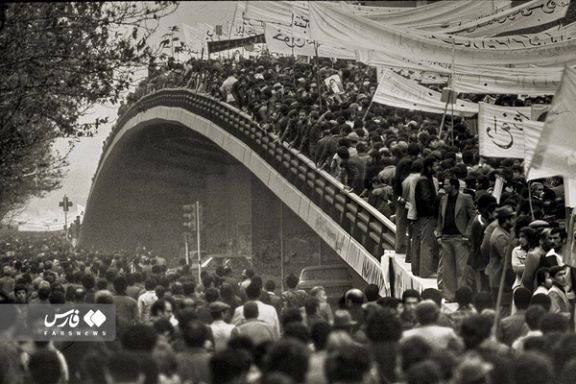
In stark contrast, another interview in Etemad portrayed the Islamic Republic as resembling North Korea, according to Yadollah Javani, the deputy commander of the IRGC. Javani accused "enemies" of attempting to sow discord between the people and the Supreme Leader. He acknowledged internal problems but focused on external threats, neglecting widespread poverty and corruption.
Javani’s discourse is typical of regime officials who dismiss most problems of governance in Iran and blame the United States and others for their unwillingness and inability to pursue economic growth.
Javani claimed that, so far, the people have protected the regime against all conspiracies. He called the Islamic revolution a miracle, despite other officials' acknowledgement that about 70 percent of the population living under the poverty line. The claim about popular support also contradicts dwindling freedoms and the regime’s repeated brutal suppression of protests.
Javani further claimed that there was nothing wrong about the Islamic Republic. Only the officials need to explain to the youth why the Islamic Republic is the continuation of the holy prophet's movement. Javani obviously ignored the extent of financial and ethical corruption among officials.
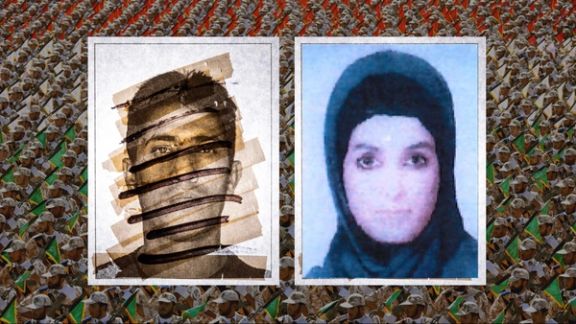
The Swedish foreign minister spoke to his Iranian counterpart following revelations of an IRGC plot to murder Swedish Jews, warning that the allegations are being treated as a "very serious" issue.
Tobias Billstrom spoke to Hossein Amir-Abdollahian on Thursday following a Swedish Radio report revealing the deportation in 2022 of two Iranians illegally in Sweden plotting to kill Swedish Jews.
“It is very serious that Iranian agents on Swedish territory have tried to murder Swedish citizens, and the fact that the targets were Jewish naturally makes it even more serious,” Billstrom stressed.
The couple, Mahdi Ramezani and Fereshteh Sanaeifarid, who had entered Sweden in 2015 on forged Afghan passports seeking asylum, were arrested in 2021 but deported in 2022 after police could not take proceedings further.
They intended to target three Swedish Jews including Aron Verständig, Chair of the Official Council of Swedish Jewish communities, who was informed of the plot in 2021. One of the other potential targets was a dual US citizen.
The suspects, believed to have been part of an IRGC plot, lived under fake identities in the country.
Deputy chief prosecutor Hans Ihrman said the FBI in the US was also investigating the couple. While there was not enough evidence to prosecute in Sweden, Ihrman said: “We have strong belief that they were here on a mission on behalf of Iran. They were seen here in Sweden as a very severe security threat. And that's the reason why they were expelled, even if we couldn't prosecute them."
Meanwhile, Daniel Stenling, head of counterintelligence in Sweden's security service, confirmed that the couple “prepared and pursued activities” with the aim of “being able to carry out physical attacks against someone or something in Sweden.”
Stenling further added that over the past years, the Swedish security services have managed to foil several other attacks planned by Iran against Sweden.
“It is already known that Iran also poses a major intelligence threat to Sweden, and that risk remains,” he went on to say.
Jews and Israelis abroad have increasingly been targets of the regime in recent years; several Iran-backed plots have been foiled in different countries including Greece, Cyprus, Azerbaijan and Argentina.
In September, the head of Israel's Mossad, David Barnea, said that Israel and its allies had foiled 27 attacks over the past year in Europe, Africa, southeast Asia and South America.
Last year, Sweden's parliament voted to designate the IRGC as a terrorist organization.
Tehran-Stockholm ties have been ever more strained since 2019 and the arrest of a former Iranian jailor, Hamid Nouri. Sweden sentenced him to life imprisonment last year over executions of political prisoners in Iran in 1988.
During the phone call, Billstrom also urged the immediate release of Johan Floderus, a Swedish diplomat of the European Union who was detained in April 2022 during a vacation in Iran on what appears to be trumped up charges of espionage.
In the fifth and concluding trial session of Floderus held at the Tehran Revolutionary Court in January, the prosecutor's representative demanded the strictest punishment for the 33-year-old Swedish citizen.

Three days after the detention of 30 journalists at the office of liberal-leaning website Fardaye Eghtesad in Tehran, five remain missing, raising fears they have been detained.
The newspaper's editor, Ali Mirzakhani, deputy editor, Behzad Bahmannezhad, and three video-journalists have not returned home since Monday and no information has been disclosed regarding their whereabouts and conditions.
On Monday evening, security forces raided the office of the economic news site, detaining and holding 30 journalists incommunicado inside the building overnight. They also confiscated all office computers and electronic devices, including mobile phones, and interrogated the staff.
The judiciary’s official news agency, Mizan, released a statement on Tuesday, claiming that the raid and journalists’ arrests were not linked to journalistic activities but were under investigation by a security agency.
Iranian media and observers say the detentions might be linked to a recent revelation published about Iran's international clandestine fund transfers.